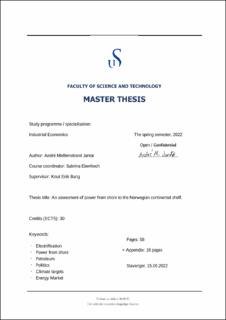| dc.description.abstract | This thesis aims to answer whether Norway should continue the development of the Norwegian Continental Shelf with power from shore, based on analysis and comprehensive literature study. The world is undergoing a transformation driven by global warming, and the emphasis on sustainable development has never been more prominent. Norway's total reduction in CO2 emissions from 1990 levels was 4,2% in 2020, implying that rapid and significant emission reductions across all sectors are necessary to reach the target. The petroleum industry is Norway's most polluting industry but also the most essential in terms of value creation, government revenues, investments, and export value. Electrification with power from shore is an emission-reducing measure that is critical for Norway to achieve emission reduction targets.
Power from shore to the Norwegian continental shelf will increase energy consumption. Norway is at a crossroads regarding the distribution of surplus zero-emission electricity. The results show that political legislation is the most powerful driver and barrier to electrifying the Norwegian continental shelf with power from shore. The environmental impact analysis shows that electrification will lower Norway's upstream and domestic emissions while increasing downstream emissions that are not included in Norway's national climate targets. The EU Emissions Trading System (EU ETS) implies that electrification has no net environmental impact on CO2 emissions in the 30 member countries if the released gas is used for quota-controlled activities. The net environmental impact outside of Europe depends on several uncertain factors.
The political and economic framework facilitates good conditions for oil and gas companies to electrify the Norwegian continental shelf. The economic sensitivity analysis implies that gas turbine efficiency has the greatest impact on the Norwegian government's decision on whether power from shore should be implemented or not. Oil fields have a limited lifetime, and power from shore reduces the power surplus in Norway, net energy exports to Europe, and increases the electricity prices in Norway.
Based on the findings and results of the three analyses, the thesis concludes that Norway should not continue the development of the Norwegian Continental Shelf with power from shore. | |
